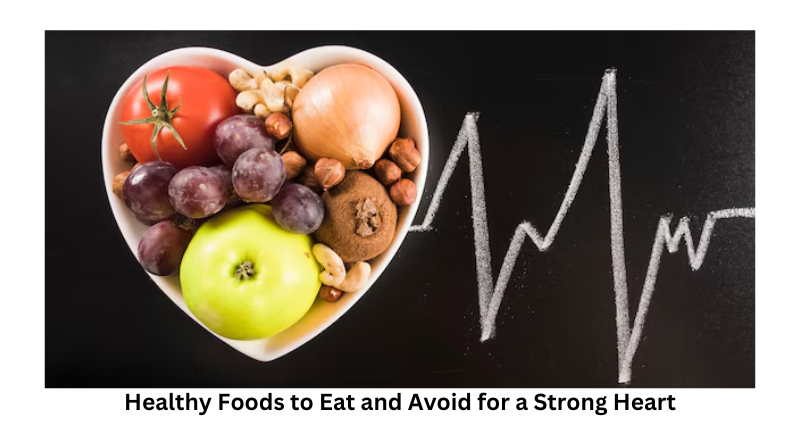Healthy Foods to Eat and Avoid for a Strong Heart
One of the best strategies to preserve heart health and lower the risk of cardiovascular conditions like stroke, arrhythmia of various classifications, etc., is to follow a healthy eating plan. Your everyday dietary decisions have the power to either strengthen or weaken your heart. Maintaining the healthiest possible heart requires knowing which foods to eat and which to avoid.
Foods to Include Fruits and Vegetables: Rich in fiber, heart-healthy antioxidants, and vital nutrients, fruits and vegetables are a great way to promote heart health. They fight inflammation, decrease cholesterol, and lower blood pressure. Because of their high vitamin, mineral, and nitrate content, leafy greens like spinach, kale, and broccoli are especially healthy. Antioxidants found in berries like raspberries, blueberries, and strawberries guard against inflammation and oxidative stress.
Whole Grains: Rich in fiber, whole grains including quinoa, brown rice, oats, and whole wheat help control cholesterol and blood pressure. Whole grains provide more vitamins, minerals, and antioxidants than processed grains because they still include their nutrient-rich bran and germ.
Healthy Fats: Not every type of fat is harmful to your heart. Good cholesterol (HDL) can rise and bad cholesterol (LDL) can fall with the aid of unsaturated fats, especially those in avocados, nuts, seeds, and olive oil. Particularly beneficial to the heart are omega-3 fatty acids, which are present in fatty fish like sardines, mackerel, and salmon. They aid in blood clot prevention, inflammation reduction, and lipid reduction.
Legumes: Rich in fiber and plant-based protein, beans, lentils, chickpeas, and other legumes provide a heart-healthy substitute for animal proteins. They include vital minerals including potassium, magnesium, and folate as well as lowering cholesterol.
Nuts and Seeds: High in fiber, antioxidants, and omega-3 fatty acids include almonds, walnuts, flaxseeds, and chia seeds. Eating nuts and seeds on a regular basis can improve heart health by lowering inflammation and cholesterol.
Foods to Avoid Red and Processed Meats: Processed meats, such bacon, sausages, and hot dogs, are heavy in salt, saturated fats, and preservatives. These have been linked to heart disease, elevated blood pressure, and elevated cholesterol. Beef, hog, and lamb are examples of red meats that should be eaten in moderation since they are high in saturated fats.
Sugar-filled foods and drinks: Heart disease, diabetes, and obesity are all associated with consuming too much sugar. Sugary meals and drinks, such sodas, sweets, pastries, and desserts, can elevate blood pressure, triglycerides, and cause weight gain. Limiting added sugars and choosing natural sweeteners, such as fruit, are crucial.
Refined Grains: During processing, the fiber and nutrients in refined grains—like white bread, white rice, and pasta—have been removed. They can lead to weight gain and blood sugar surges, both of which are heart disease risk factors. The healthier option is whole grains.
Trans Fats: Trans fats are bad for your heart and may be found in margarine, baked products, and a lot of processed meals. They raise the risk of heart disease by raising bad cholesterol (LDL) and lowering good cholesterol (HDL). Avoid goods that contain partly hydrogenated oils and always read food labels.
Excessive salt: Consuming too much salt raises the risk of hypertension, which is a primary cause of heart disease. Sodium is frequently found in processed meals, canned soups, fast food, and salty snacks. Instead of using salt to season your meal, use herbs and spices and choose low-sodium solutions.
